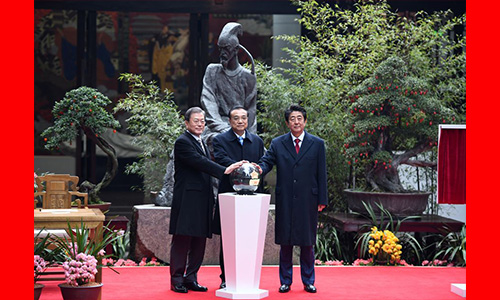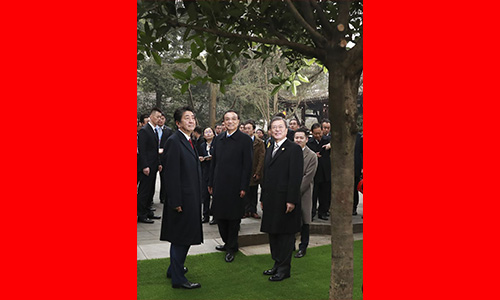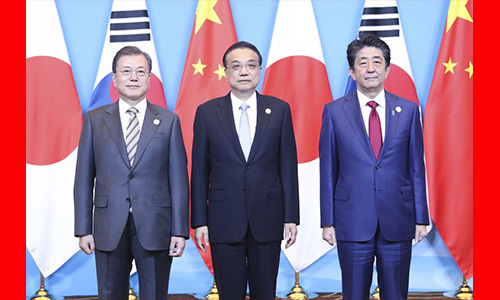
Chinese Premier Li Keqiang, President of the Republic of Korea (ROK) Moon Jae-in and Japanese Prime Minister Shinzo Abe attend a launching ceremony of a commemorative envelope marking the 20th anniversary of trilateral cooperation at the Du Fu Thatched Cottage Museum in Chengdu, southwest China's Sichuan Province, Dec. 24, 2019. Photo:Xinhua
The latest meeting of leaders of China, Japan and the Republic of Korea (ROK) bolstered mutual trust and trilateral cooperation, international experts and officials have said.
China, Japan and the ROK on Tuesday released the Trilateral Cooperation Vision for the Next Decade and the Trilateral + X Cooperation Early Harvest Projects during the 8th China-Japan-ROK leaders' meeting in China's southwestern city of Chengdu.
The meeting made the world once again aware of the influence of the three countries on regional and global affairs, said Liu Di, professor at the Faculty of Social Sciences of Kyorin University in Tokyo.
Over the past 20 years, great achievements have been made in trilateral cooperation among the three countries, which played an important role in guiding the development of world economy in a rational way, Liu said.
At a time when the international order and economic and trade relations are facing unprecedented uncertainties, mutual trust and cooperation among the three countries are of great significance to both the region and the world, the professor added.

Chinese Premier Li Keqiang, President of the Republic of Korea (ROK) Moon Jae-in and Japanese Prime Minister Shinzo Abe pose for photos after they planted an osmanthus tree together during a commemorative activity marking the 20th anniversary of the trilateral cooperation at the Du Fu Thatched Cottage Museum in Chengdu, southwest China's Sichuan Province, Dec. 24, 2019. Photo:Xinhua
At present, there is a growing attention on non-traditional security issues in east Asia, said Liu, adding that the three countries will share broad space for cooperation in these fields.
Lee Jong-heon, former secretary-general of the Trilateral Cooperation Secretariat, said the three countries reached more consensus on how to promote peace and prosperity in Northeast Asia through the meeting, which is conducive to further boosting regional cooperation.
The three countries also strengthened in-depth exchanges and cooperation on common challenges in such fields as environmental protection, health and aging population, which will bring benefits to their people.
Lucio Blanco Pitlo, a lecturer with the Chinese Studies Program at Ateneo de Manila University, said the meeting provided an important platform for communication among the three countries in Northeast Asia.
Amid profound changes taking place in the international landscape, the leaders of China, Japan and the ROK agreed to further promote cooperation, manage differences, uphold free trade and multilateralism and realize the complete denuclearization of the Korean peninsula and lasting peace in the region, Lucio said.
As the world is fogged by surging uncertainties, further promoting trilateral cooperation among the three countries is conducive to regional peace and stability, as well as global prosperity and development, Lucio added.
Bambang Suryono, an Indonesian scholar and president of the Jakarta-based think tank Nanyang ASEAN Foundation, said the successful holding of the 8th China-Japan-ROK leaders' meeting marks a new starting point for cooperation among China, Japan and the ROK, and has positive effects on the economic prosperity, security and stability of the region and even the world.

Chinese Premier Li Keqiang poses for a group photo with President of the Republic of Korea (ROK) Moon Jae-in and Japanese Prime Minister Shinzo Abe before the 8th China-Japan-ROK leaders' meeting in Chengdu, southwest China's Sichuan Province, Dec. 24, 2019. Photo:Xinhua
Against the backdrop of the rising trade protectionism, the three countries have strengthened cooperation and jointly safeguarded free trade, which will play a major role in stabilizing global economic development and maintaining the trade order, Suryono noted.
Subhomoy Bhattacharjee, a consultant with the Research and Information System for Developing Countries based in India, said he has recognized China's positive role in the mechanism of China-Japan-ROK cooperation, adding that China has been committed to maintaining peace and stability in Northeast Asia, advocating coordinated economic progress of all countries and playing an important role in promoting common development in the region.
As China, Japan and the ROK are three leading economies in Eastern Asia, the leaders' meeting has stressed the need to speed up free trade area negotiations among the three countries, and called on related parties to work to ensure the formal signing of the Regional Comprehensive Economic Partnership, Victor Pavlyatenko of Moscow State Institute of International Relations said, adding that at present, many countries are expected to join the deal, and the process of Asian economic integration is accelerating.
Pornchai Trakulwaranont, member of parliament of Thailand, said the mechanism of cooperation is conducive to China, Japan and the ROK, as well as regional economic development and cooperation in the future, bringing regional countries closer.
